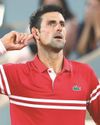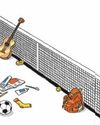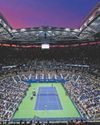Louis Armstrong Stadium has long been a symbol of the US Open’s connection with Queens. With a new roof and modern amenities, Louis 2.0 also exemplifies the tournament’s future

In a fitting finale to the multi-year overhaul of the USTA Billie Jean King National Tennis Center, the first major stadium used at the US Open will be the final piece of its transformation puzzle. Louis Armstrong Stadium—originally built in 1964 for the World’s Fair and, 54 years later, built anew—not only serves as a symbol of change, but is a modern take on a classic, intimate tennis venue.
“It is going to have the feel of the old Armstrong, with fans really seated on top of play,” says Matt Rossetti of Rossetti Architects, designers of the National Tennis Center’s rebuild.
“This is the last leg of this transformation, with the big goals being more open space, fan amenities, shade and an improved experience,” adds Danny Zausner, COO of the National Tennis Center. “We were able to check all of those boxes.”
With 85 percent of US Open fans entering on the east side of the grounds, Zausner wanted something architecturally significant to greet them. He also needed something to cap the $600-million renovation project that redid 85 percent of the campus. It comes in the form of the brand-new Armstrong, a 14,061-seat stadium with the center’s second retractable roof—one completely different than the cover recently put over Arthur Ashe Stadium.
Designed in an octagon shape with shortened ends and expanded sides, Armstrong’s seating surrounds a court positioned for a natural north-to-south breeze. Above it is a two-piece retractable, lightweight, PTFE fabric roof, with material sliding atop itself to open larger than the court surface. Two 284,000-pound panels travel on a 27inch wheel along a steel track, opening in under seven minutes and creating a 38,160-square-foot opening—larger than 18 courts—in what Rossetti calls a “complex stackable sun room.”
This story is from the Sept Oct 2018 edition of Tennis.
Start your 7-day Magzter GOLD free trial to access thousands of curated premium stories, and 9,000+ magazines and newspapers.
Already a subscriber ? Sign In
This story is from the Sept Oct 2018 edition of Tennis.
Start your 7-day Magzter GOLD free trial to access thousands of curated premium stories, and 9,000+ magazines and newspapers.
Already a subscriber? Sign In

The Tennis Conversation: Jenson Brooksby, a piano man
Billy Joel may be a New York City icon, but the fans in Queens should start getting to know this piano man

The Five-Step Sit-Down Plan
Don’t neglect the value of a smart changeover routine

MAKING THE TURN
Six years after saying goodbye to the protour grind, Mardy Fish may be more active than ever—on the court, on the course, and helping combat a struggle anyone can encounter

FOOD FOR THOUGHT
Queens is known for its gastronomy as much as its tennis. Daniil Medvedev, equal parts sugar and spice, hopes to add a unique flavor to the borough as he vies for his first major

SUMMER IN THE CITIES
Broadway may not re-open until mid September, but tennis offers its own brand of live theatre in the preceding months

REOPEN SEASON
The pandemic halted tennis as an up-close experience— but is now giving way to pandemonium among crowds. As the pro game reopens this summer and fans gather again, we’re realizing what we’ve been missing for so long

Court of Appeals
Resolving Your Rules Questions&Quarrels

An Open Mind: New York's Slam has no shortage of history, but it always evolves
In the last decade, Arthur Ashe Stadium got a roof, and a new Grandstand and Louis Armstrong Stadium debuted.

Those Fall Feels
The end of summer may be bittersweet, but getting lost amid the backroads of NEW ENGLAND adds a silver—and golden—lining to the season change. Pack a few sweaters along with your tennis kit and prepare for leaf-peeping, scenic drives and delicious autumnal ingredients to pair with your forehands
Court of Appeals
Resolving Your Rules Questions & Quarrels